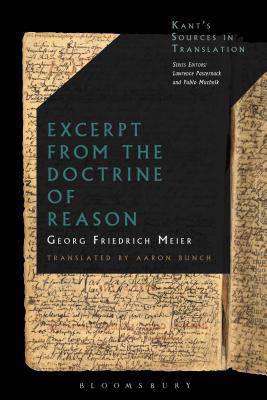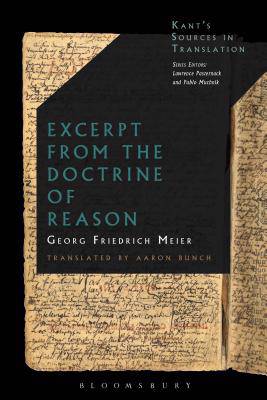
- Afhalen na 1 uur in een winkel met voorraad
- Gratis thuislevering in België vanaf € 30
- Ruim aanbod met 7 miljoen producten
- Afhalen na 1 uur in een winkel met voorraad
- Gratis thuislevering in België vanaf € 30
- Ruim aanbod met 7 miljoen producten
Zoeken
Omschrijving
First published in 1752, Excerpt from the Doctrine of Reason [Auszug aus der Vernunftlehre] was written as a textbook and widely adopted by many 18th-century German instructors, but most notably by Immanuel Kant. For forty years Kant used the Excerpts as the basis of his lectures on logic making extensive notes on his copy of the text.
More than a text on formal logic, Excerpt from the Doctrine of Reason covers epistemology and the elements of thought and language Meier believed made human understanding possible. Working across the two dominant intellectual forces in modern philosophy, the rationalist and the empiricist traditions, Meier's work was also instrumental to the introduction of English philosophy into Germany; he was among the first German philosophers to study John Locke's philosophy in depth. This complete English translation of Meier's influential textbook is introduced by Riccardo Pozzo and enhanced by a glossary and a concordance correlating Meier's arguments to Kant's logic lectures, the related Reflexionen and the Jäsche Logic of 1800 - the text considered of fundamental importance to Kant's philosophy. For scholars of Kant, Locke and the German Enlightenment, this valuable translation and its accompanying material presents the richest source of information available on Meier and his 18th-century work.Specificaties
Betrokkenen
- Auteur(s):
- Vertaler(s):
- Uitgeverij:
Inhoud
- Aantal bladzijden:
- 216
- Taal:
- Engels
- Reeks:
Eigenschappen
- Productcode (EAN):
- 9781474229319
- Verschijningsdatum:
- 28/01/2016
- Uitvoering:
- Hardcover
- Formaat:
- Genaaid
- Afmetingen:
- 156 mm x 234 mm
- Gewicht:
- 480 g

Alleen bij Standaard Boekhandel
+ 780 punten op je klantenkaart van Standaard Boekhandel
Beoordelingen
We publiceren alleen reviews die voldoen aan de voorwaarden voor reviews. Bekijk onze voorwaarden voor reviews.







